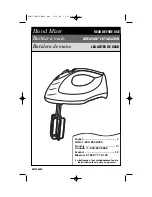
11
Safety of the operator is one of the main concerns all equipment manufacturers. It is
considered in the design and development of a new piece of equipment. In spite of this,
many accidents occur which could have been avoided by the operator being more
careful. The operator, You, can avoid most if not all accidents by observing and
following the instructions in the manual. Use common sense and require those working
with you do the same.
SAFETY FIRST
Do not allow personnel other than the qualified operator near the machine.
Never start a machine until all guards and safety shields are in place.
Do not lubricate, clean or adjust the machine while it is in motion or under power.
If any WARNING or DANGER label is damaged, obscured or missing replace it.
Do not paint over any labels. The location of all safety related labels are in the
first few pages of the parts portion of this manual.
Do not attempt to operate this equipment under the influence of drugs or alcohol.
Have all operators review the safety instructions annually.
Keep all children and bystanders a safe distance away from this truck, it is
dangerous to the uninformed. The discharge elevator can be remotely lowered or
raised suddenly. The discharge chain can start remotely. These are controlled by
the operator in the cab of the truck who may not be able to see all sides of the
elevator.
The limits of the machine are noted on the loading instruction label on the front of
the machine. Do not exceed them.
This machine is designed to mix roughage and food supplements for ruminating
animals. Do not use it for any other purpose.
Remove key from the ignition before removing shields for maintenance,
adjustment or service.
Never enter a mixer/feeder while in operation.
Keep transmissions in gear when traveling downhill.
Keep sparks, lighted matches, and open flame away from the top of battery.
Battery gas can explode. Never check battery charge by placing a metal object
across the posts. Do not charge a frozen battery; it may explode. Warm battery
to room temperature before charging.
Escaping fluid under pressure can penetrate the skin causing serious injury or
death. Avoid the hazard by relieving hydraulic pressure before disconnecting any
lines. Tighten all connections before applying pressure. Search for leaks with a
piece of cardboard or wood. Protect hands and body from high pressure fluids. If
an accident occurs, see a doctor immediately. Any fluid injected into the skin
must be surgically removed within a few hours or gangrene may result.







































